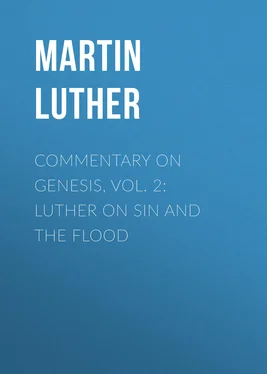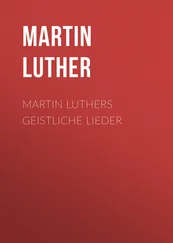Martin Luther - Commentary on Genesis, Vol. 2 - Luther on Sin and the Flood
Здесь есть возможность читать онлайн «Martin Luther - Commentary on Genesis, Vol. 2 - Luther on Sin and the Flood» — ознакомительный отрывок электронной книги совершенно бесплатно, а после прочтения отрывка купить полную версию. В некоторых случаях можно слушать аудио, скачать через торрент в формате fb2 и присутствует краткое содержание. Жанр: foreign_prose, foreign_religion, Философия, foreign_psychology, foreign_antique, на немецком языке. Описание произведения, (предисловие) а так же отзывы посетителей доступны на портале библиотеки ЛибКат.
- Название:Commentary on Genesis, Vol. 2: Luther on Sin and the Flood
- Автор:
- Жанр:
- Год:неизвестен
- ISBN:нет данных
- Рейтинг книги:4 / 5. Голосов: 1
-
Избранное:Добавить в избранное
- Отзывы:
-
Ваша оценка:
- 80
- 1
- 2
- 3
- 4
- 5
Commentary on Genesis, Vol. 2: Luther on Sin and the Flood: краткое содержание, описание и аннотация
Предлагаем к чтению аннотацию, описание, краткое содержание или предисловие (зависит от того, что написал сам автор книги «Commentary on Genesis, Vol. 2: Luther on Sin and the Flood»). Если вы не нашли необходимую информацию о книге — напишите в комментариях, мы постараемся отыскать её.
Commentary on Genesis, Vol. 2: Luther on Sin and the Flood — читать онлайн ознакомительный отрывок
Ниже представлен текст книги, разбитый по страницам. Система сохранения места последней прочитанной страницы, позволяет с удобством читать онлайн бесплатно книгу «Commentary on Genesis, Vol. 2: Luther on Sin and the Flood», без необходимости каждый раз заново искать на чём Вы остановились. Поставьте закладку, и сможете в любой момент перейти на страницу, на которой закончили чтение.
Интервал:
Закладка:
136. Moses does not exhibit in his narrative the verbose diction characteristic of pagan literature, where we often find one and the same argument embellished and polished by a variety of colors. We find by experience that no human power of description can do justice to inward emotions. In consequence, verbosity, as a rule, comes short of expressing emotion. Moses employs the opposite method, and clothes a great variety of arguments in scant phraseology.
137. Above the historian used the expression, "when they were in the field." Thereby Moses indicates that the murderer Cain had watched his opportunity to attack his brother when both were alone. All the circumstances plainly show that Abel was not idle at the time; for he was in the field, where he had to do the things his father committed to him. From Moses' statement we may infer that Abel's parents felt absolutely no fear of danger. For, although at the outset they had feared that the wrath of Cain would eventually break out into still greater sin, Cain, by his gentleness and pretended affection, prevented all suspicion of evil on the part of his parents. For had there been the least trace of apprehension, they certainly would not have permitted Abel to go from their presence alone. They would have sent his sisters with him as companions; for he no doubt had some. Or his parents themselves would have prevented by their presence and authority the perpetration of so great a crime. As already stated, also the mind of Abel was perfectly free from suspicion. For, had he suspected the least evil at the hand of his brother, he would doubtless have sought safety by flight. But after he had heard that Cain bore the judgment of God with composure, and did not envy the brother his honor, he pursued his work in the field with a feeling of security.
138. What orator could do justice to the scene which Moses depicts in one word: "Cain rose up against his brother?" Many descriptions of cruelty are to be found on every hand, but could any be painted as more atrocious and execrable than is the case here? "He rose up against his brother," Moses writes. It is as if he had said, Cain rose up against Abel, the only brother he had, with whom he had been brought up and with whom he had lived to that day. But not only the relationship Cain utterly forgot; he forgot their common parents also. The greatness of the grief he would cause his parents by such a grave crime, never entered his mind. He did not think that Abel was a brother, from whom he had never received any offense whatever. For Cain knew that the honor of having offered the more acceptable sacrifice, proceeded not from any desire or ambition in Abel, but from God himself. Nor did Cain consider that he, who had hitherto stood in the highest favor with his parents, would lose that favor altogether and would fall under their deepest displeasure as a result of his crime.
139. It is recorded in history of an artist who painted the scene of Iphigenia's sacrifice, that when he had given to the countenance of each of the spectators present its appropriate expression of grief and pain, he found himself unable to portray the vastness of the father's grief, who was present also, and hence painted his head draped.
140. Such is the method, I think, Moses employs in this passage, when he uses the verb yakam , "Rose up against." What tragical pictures would the eloquence of a Cicero or a Livy have drawn in an attempt to portray, through the medium of their oratory, the wrath of the one brother, and the dread, the cries, the prayers, the tears, the uplifted hands, and all the horrors of the other! But not even in that way can justice be done to the subject. Moses, therefore, pursues the right course, when he portrays, by a mere outline, things too great for utterance. Such brevity tends to enlist the reader's undivided attention to a subject which the vain adornment of many words disfigures and mars, like paint applied to natural beauty.
141. This is true also of the additional statement, "He slew him." Occasionally we see men start a quarrel and commit murder for a trivial cause, but no such ordinary murder is described here. Murderers of this kind immediately afterward are filled with distress; they grieve for the deeds they have done and acknowledge them to be delusions of the devil by which he blinded their minds. Cain felt no distress; he expressed no grief, but denied the deed he had done.
142. This satanic and insatiable hatred in hypocrites is described by Christ in the words, "When they kill you, they will think that they do God service," Jn 16, 2. So the priests and the kings filled Jerusalem with the blood of the prophets and gloried in what they did as a great achievement; for they considered this as proof of their zeal for the Law and the house of God.
143. And the fury of popes and bishops in our day is just the same. They are not satisfied with having excommunicated us again and again, and with having shed our blood, but they wish to blot out our memory from the land of the living, according to the description in the Psalm, "Rase it, rase it, even to the foundation thereof," Ps 137, 7. Such hatred is not human but satanic. For all human hatred becomes mellow in time; at all events, it will cease after it has avenged our injury and gratified its passion. But the hatred of these Pharisees assumes constantly larger dimensions, especially since it is smoothed over by a show of piety.
144. Cain, therefore, is the father of all those murderers who slaughter the saints, and whose wrath knows no end so long as there remains one of them, as is proved in the case of Christ himself. As for Cain, there is no doubt of his having hoped that by putting Abel to death he should keep the honor of his birthright. Thus, the ungodly always think that their cruelty will profit them in some way. But when they find that their hope is vain they fall into despair.
145. Now, when the fact of this shameful murder was made known to the parents, what do we think must have been the sad scenes resulting? What lamentations? What sighs and groans? But I dwell not on these things; they are for the man with the gifts of eloquence and imagination to describe. It was certainly a marvel that both parents were not struck lifeless with grief. The calamity was rendered the greater by the fact that their first-born, who had aroused so large hopes concerning himself, was the perpetrator of this horrible murder.
146. If, therefore, Adam and Eve had not been helped from above, they could never have been equal to this disaster in their home; for there is nothing like it in all the world. Adam and Eve were without that consolation which we may have in sudden and unexpected calamities, namely, that like evils have befallen others and have not come upon us alone. Our first parents had only two sons, though I believe that they had daughters also; and therefore they lacked such instances of grief in the human family as we have before our eyes.
147. Who can doubt, moreover, that Satan by this new species of temptation increased greatly the grief of our first parents? They no doubt thought, Behold, this is all our sin. We, in paradise, wished to become like God; but by our sin we have become like the devil. This is the case also with our son. We loved only this son, and made everything of him! Our other son, Abel, was righteous before us, above this son; but of his righteousness we made nothing! This elder son we hoped would be he who should crush the serpent's head; but behold, he himself is crushed by the serpent! Nay, he himself has become like the serpent, for he is now a murderer. And whence is this? Is it not because he was born of us, and because we, through our sin, are what we are? Therefore it is to our flesh; therefore it is to our sin, that this calamity must be traced.
148. It is very probable, accordingly, and the events of the series of years which followed strengthen this probability, that the sorrowing parents, shaken to the core by their calamity, abstained for a long time from connubial intercourse. For it appears that when Cain committed this murder he was about thirty years of age. During this period some daughters were born unto Adam. In view of the subsequent statements, verse 17, that "Cain knew his wife," he no doubt married a sister. Moreover, since Cain himself says in verse 14, "It shall come to pass that everyone that findeth me shall slay me", and as it is further said in verse 15, "The Lord set a mark upon Cain, lest any finding him should kill him"—it appears most probable from all these circumstances that Adam had many children besides Cain and Abel, but these two only are mentioned, on account of their important and memorable history, and because these two were their first and most remarkable children. It is my full belief that the marriage of our first parents was most fruitful during the first thirty years of their union. Somewhere Calmana and Dibora are mentioned as daughters of Adam, but I know not whether the authors are worthy of credence. Inasmuch, therefore, as the birth of Seth is recorded as having taken place a long time after this murder, it seems to me very probable that the parents, distressed beyond measure at this monstrous crime in the bosom of their family, refrained for a long time from procreation. While Moses does not touch upon all these things, he intimates enough to arouse in the reader a desire to dwell upon the noteworthy events which the absence of detailed information permits us to survey only from a distance.
Читать дальшеИнтервал:
Закладка:
Похожие книги на «Commentary on Genesis, Vol. 2: Luther on Sin and the Flood»
Представляем Вашему вниманию похожие книги на «Commentary on Genesis, Vol. 2: Luther on Sin and the Flood» списком для выбора. Мы отобрали схожую по названию и смыслу литературу в надежде предоставить читателям больше вариантов отыскать новые, интересные, ещё непрочитанные произведения.
Обсуждение, отзывы о книге «Commentary on Genesis, Vol. 2: Luther on Sin and the Flood» и просто собственные мнения читателей. Оставьте ваши комментарии, напишите, что Вы думаете о произведении, его смысле или главных героях. Укажите что конкретно понравилось, а что нет, и почему Вы так считаете.












